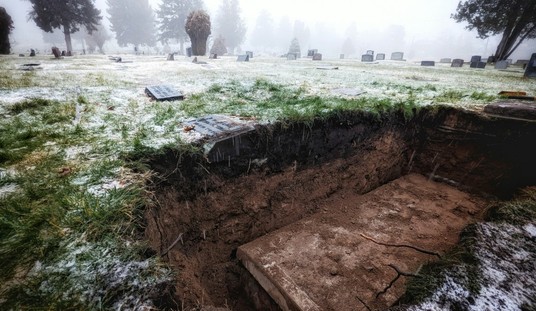In animal behavior, a phenomenon known as a "Behavioral Sink" describes a collapse in social behavior resulting from overpopulation and overcrowding. Ethologist John B. Calhoun demonstrated this phenomenon using his "Rat Utopia" experiment, which I first learned about when I was in college, studying biology with an emphasis on animal behavior. It's an interesting experiment; in the setup, a big habitat housed a population of rats, whose every need was met. There were no predators. The rats had all the food and water they wanted. There was ample bedding material. The rats were sheltered, cared for, and had every need met with no effort on their part.
Thus the term "rat utopia."
Sounds a lot like what the progressive left claims to want in their lifestyles, yes? Or even, in some cases, what they have achieved. But there's a problem: The rat utopia failed — catastrophically. The most famous of these experiments was conducted by Calhoun over sixty years ago, but they are still relevant today — maybe even more so.
Calhoun describes the starting conditions:
The males and females that initiated each experiment were placed, in groups of the same size and sex composition, in each of the four pens that partitioned a 10-by-14-foot observation room. The pens were complete dwelling units; each contained a drinking fountain, a food hopper and an elevated artificial burrow, reached by a winding staircase and hold ing five nest boxes. A window in the ceiling of the room permitted observation, and there was a door in one wall. With space for a colony of 12 adults in each pen-the size of the groups in which rats are normally found-this setup should have been able to support 48 rats comfortably. At the stabilized number of 80, an equal distribution of the animals would have found 20 adult rats in each pen. But the animals did not dispose themselves in this way.
That last sentence proves Calhoun to be something of a master of understatement. What happened in the end should send chills down the spines of anyone paying attention to current events today. Especially events in our major urban areas.
Calhoun repeated his experiment with mice a few years later, and the mouse utopia ended much the same way as the earlier rat utopia; neither population reached the carrying capacity of the habitat, and both populations exhibited social pathologies including aggression, juvenile rats forming gangs and attacking their elders, refusal to court or breed, and females abandoning or killing their young.
Sound familiar? If you've been following the news lately, it should.
See Related: 'Still a Big Issue': Jim Jordan Predicts 'Urban Crime' Will Have 'Electoral Consequences' for Biden
Even in the mid-'80s, when I was studying this, the parallels to human behavior in our major cities seemed pretty obvious. This begs the question: How many of the social pathologies we see in our major urban areas are due to the rat utopia phenomenon? Are our major cities undergoing a behavioral sink?
It's not impossible. Behaviorally, as a population, humans aren't as much different than rats as we'd like to think. We're driven by many of the same things: to find a mate, to build a nest (a home), and to protect what's ours.
See Related: UCLA Cancels Classes After Violence Erupts at Pro-Hamas Encampment Overnight
Take a look at the arc of our major cities and the unrest that has taken place in the last few years on our college campuses as well as in those cities. Look at the "protestors" — rioters — who take part. Most of these are not oppressed peoples seeking justice; the protestors are overwhelmingly upper-middle-class youths who have never faced a real challenge, who have rarely, if ever, been refused anything, and who have never known any real hardship. These young Eloi are in the "weak people make hard times" stage of societal progress.
So they invent challenges, including fake oppressions, and invented obstacles that they manage to fail to overcome — in other words, various social pathologies that John B. Calhoun would have easily foreseen.
See Related: Former Situation Room Officer Claims Pence Came 'Close' to Being Killed on Jan 6
Our major urban areas are set up almost exactly like the rat and mouse utopias. Every resident's needs are met, thanks to Big Daddy Government. There are few, if any, real hardships or challenges; as I've been saying for years, there is no abject poverty in the United States, only relative poverty. The populace is well-fed, housed, and protected, and yet ample social pathologies have arisen in those cities, from gang crime to sexual assaults to civil unrest at any provocation. It seems obvious that living in what are essentially overcrowded hives is bad for people; ditto young people coming up with no manner of adversity to overcome. Strength — not just physical strength, but intellectual and moral strength — comes from achieving, from overcoming adversity, from formulating and achieving goals. Too many people today do none of those things, and our cities are paying the price for that.
Granted, my bias is toward a rural lifestyle over the urban life. I grew up that way and although I lived in the 'burbs of a major city — Denver — for many years, I'm delighted beyond words to now, in my sixties, have returned to my roots. However, the overcrowding may not apply to rural populations, but the lack of challenge does, and even in small rural communities, you can see the effects. I'd argue that they are present to a much lesser extent than in the cities — but they are there.
In the rodent utopias, the end stage of the experiment was a population crash, to near-extinction. That's not without precedent in human history; for one example, the Bronze Age Collapse saw cities and entire civilizations destroyed, entire ethnic groups migrated to new areas, and human civilization itself came within a whisker of failing entirely.
In case you're wondering, I don't have a good answer for this problem. Some kind of crisis may well be inevitable. There just are no easy answers to a problem like this, other than each of us preparing ourselves and our families to deal with whatever might happen, as the huge human mouse utopia enters into its end stages. Because, even if things get bad, there is always the core, the tough people who make good times, and in every such event in human history, those are the people who have built a new society on the ruins of the old.














